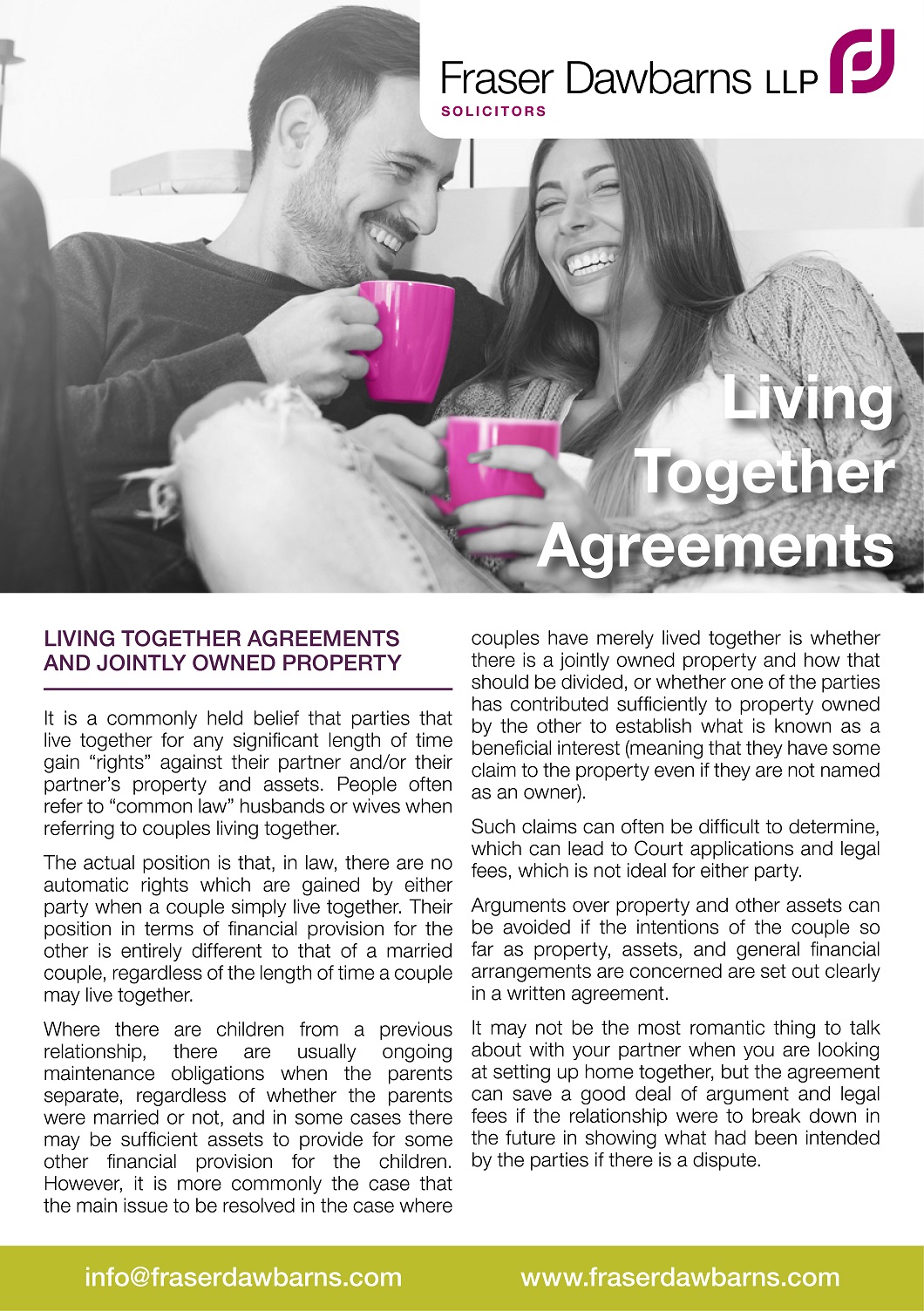Living Together Agreements (Leaflet)
Cohabitation Agreements and Jointly Owned Property
It is a commonly held belief that parties that live together for any significant length of time gain “rights” against their partner and/or their partner’s property and assets. People often refer to “common law” husbands or wives when referring to couples living together.
The actual position is that, in law, there are no automatic rights which are gained by either party when a couple simply live together. Their position in terms of financial provision for the other is entirely different to that of a married couple, regardless of the length of time a couple may live together.
Where there are children from a previous relationship, there are usually ongoing maintenance obligations when the parents separate, regardless of whether the parents were married or not, and in some cases there may be sufficient assets to provide for some other financial provision for the children. However, it is more commonly the case that the main issue to be resolved in the case where couples have merely lived together is whether there is a jointly owned property and how that should be divided, or whether one of the parties has contributed sufficiently to property owned by the other to establish what is known as a beneficial interest (meaning that they have some claim to the property even if they are not named as an owner).
Such claims can often be difficult to determine, which can lead to Court applications and legal fees, which is not ideal for either party.
Arguments over property and other assets can be avoided if the intentions of the couple so far as property, assets, and general financial arrangements are concerned are set out clearly in a written agreement.
It may not be the most romantic thing to talk about with your partner when you are looking at setting up home together, but the agreement can save a good deal of argument and legal fees if the relationship were to break down in the future in showing what had been intended by the parties if there is a dispute.
Things to Consider
- If you are buying a house in whose name should you buy?
- If you buy in your joint names you will need to consider whether you record your respective financial contributions particularly if these are unequal because otherwise you will be deemed to share the equity in the property in equal shares.
- You will need to decide whether you want to hold the property in equal shares and in such a way that upon the death of one of you it automatically passes to the survivor (known as joint tenants) or whether you wish to hold as tenants in common such that your share in the property (whether it be 50% or more or less) can be left by you in a Will to a third party.
- If you open a joint bank account remember that you will both be jointly and severally liable for any overdraft - which means you could be paying back money squandered by your partner if he/she has a spending spree without money being in the account but you will both have an equal entitlement to any credit balance irrespective of who has paid the money in.
- Finally, do not forget to make a Will. If you are not married, and die without a Will your Estate will automatically pass to any children that you may have or, if you have no children, to your parents and/or siblings and wider family. Your partner will have no interest in your Estate which may not be your wish. Only if your partner was financially dependent upon you at the time of your death could they make a claim against your Estate but this would be a lengthy and often costly process.
It is not only couples who are looking at setting up home together who can enter into such an agreement. Even if a couple have been living together for any length of time, a living together or cohabitation agreement can be drawn up if both parties are happy to enter into it.
In summary, cohabitation/living together agreements, like pre-nuptial or post-nuptial agreements, are not officially recognised in English Law, but are documents which, if drawn up correctly, a Court would take serious note of in the event that there was a dispute between the parties at a later date and, on that basis, are something which all couples living together or intending to live together, should consider.
Why Choose Fraser Dawbarns?
- Direct access to your own dedicated lawyer
- Fixed fee initial consultation
- Full range of legal services
- Clear prices & no hidden costs
Read our Other Services Leaflets Here
Fraser Dawbarns offers a wide range of services to our clients, a selection of which are detailed in the leaflets below. Hard copies are available from the reception of each of our offices. If you would like to find out more about our legal services and how we can help you, please browse the leaflets below.
- Administration of Estates
- Advice for the Elderly
- Building Disputes
- Buying or Selling an Established Business
- Buying, Selling and Remortgaging
- Employment Law for Employers
- Employment Law for Employees
- Family Matters
- Fixed Fee Divorce
- Land Registration
- Leasing Land and Commercial Property
- Legal Disputes
- Making A Will
- Personal Injury Claims
- Powers of Attorney
- Pre and Post Nuptial Agreements
- Setting Up a Business
- Terms and Conditions of Business
- Welcome to Fraser Dawbarns
Related Articles
Recommended By The Legal 500 Directory*
*We are recommended for the following practice areas: Corporate and Commercial, Debt Recovery, Employment, Personal Injury: Claimant, Agriculture and Estates, Contentious Trusts and Probate, Family, Personal Tax, Trusts and Probate & Commercial Property.
ServicesContact

















